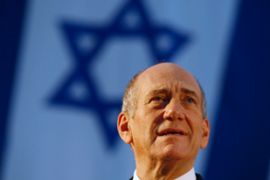Kadima sets Olmert deadline
Primary election that could replace prime minister set for September 17.

Olmert had agreed with Israel’s Labour party, with which Kadima form a coalition, to hold the internal election in September to try to keep the alliance together after the police investigation.
Olmert, the former mayor of Jerusalem, is under investigation for allegedly receiving $150,000 in cash over a 15-year period.
New leader
A newly elected leader for Kadima, the biggest party in parliament, could try to form a new government.
If they fail, Olmert has a chance of remaining as prime minister until the next election, which could be held early before the end of the year. The next scheduled election is not until 2010.
“It’s impossible to continue this way. We need to make repairs, first of all internally, and this process demands a different prime minister,” Livni said on Israel’s Channel 10 television.
Morris Talansky, a US businessman, testified in an Israeli court in May as part of the investigation into Olmert. Both Olmert and Talansky have denied any wrongdoing.
Olmert has described the funds as legitimate contributions to election campaigns he waged before becoming prime minister in 2006, but said he would resign if indicted.
In the event of a run-off, a second round of elections would be held on September 24, Kadima said in a statement.
Resignation calls
Olmert has faced a number of calls to resign during his tenure.
After decades of Israel’s “strategic ambiguity” stance over whether or not the country had nuclear weapons, Olmert hinted during an interview on German television in December 2006 that Israel did have weapons of mass destruction.
“Iran, openly, explicitly and publicly, threatens to wipe Israel off the map. Can you say that this is the same level, when they are aspiring to have nuclear weapons, as America, France, Israel and Russia?” he said.
Olmert also faced calls to resign following the Winograd Report, released in 2008, which detailed Israel’s systematic failures leading up to and during the 2006 war with Hezbollah, the Shia Lebanese organisation.
Golan Heights
Concentrating on the job in hand, Olmert said on Tuesday that Israel had resumed indirect talks with Syria in Turkey and called on Damascus to break with Iran in favour of a broader peace.
Israel and Syria launched Turkish-mediated talks in May, but have not yet agreed to hold face-to-face negotiations.
“At a certain stage it will not be enough simply to make signals, no matter how positive they are,” Olmert said in a speech in Jerusalem, as his envoys began a fourth round of indirect talks with Syria.
“Syria must decide between favouring Iran, partnership in the axis of evil and suffering international isolation, and peace, economic prosperity and a place among the family of nations,” Olmert said.
Olmert described the fresh round of talks as “serious and practical”.
Negotiations centre on the fate of the Golan Heights, a strategic plateau that Israel captured from Syria in the six-day 1967 war between Israel and its Arab neighbours.
Damascus demands the return of all of the Golan Heights. Israel, in turn, wants Syria to scale back ties with its main foes – Iran, Palestinian Hamas and Lebanese Hezbollah. Syria has so far refused to do so.